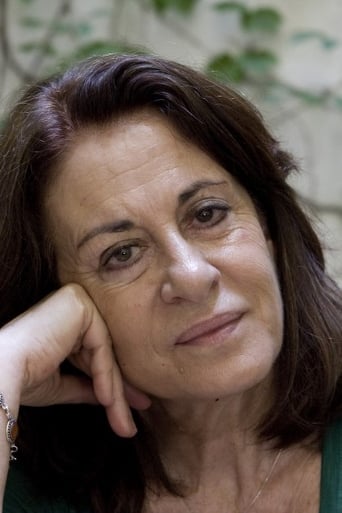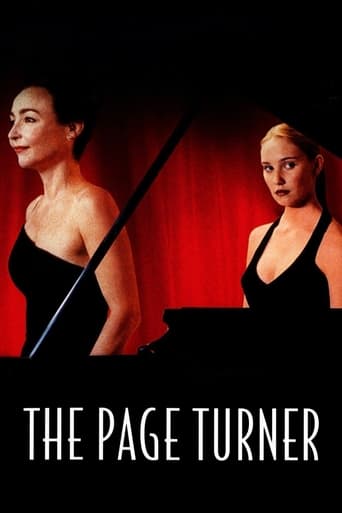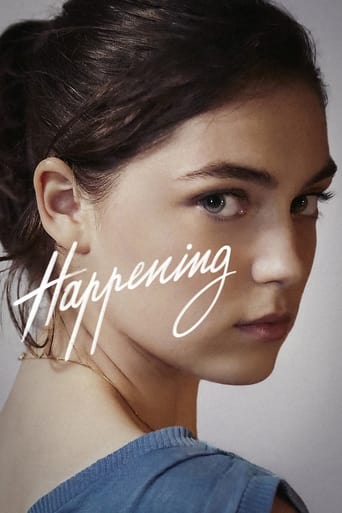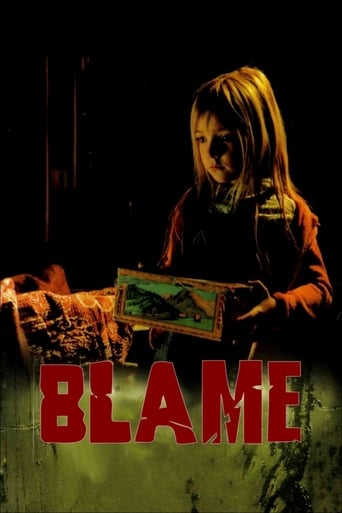
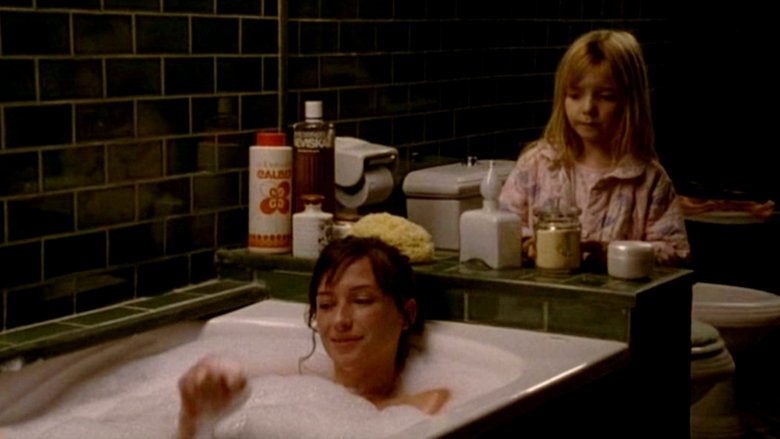
Blame (2006)
When nurse Gloria has financial difficulties, her friend Dr. Ana Torres invites her to move with her six year-old daughter Vicky to her old big house where she runs a gynecologic clinic. In return, Gloria will assist Ana in her clinic in the afternoons.
Watch Trailer
Cast
Similar titles
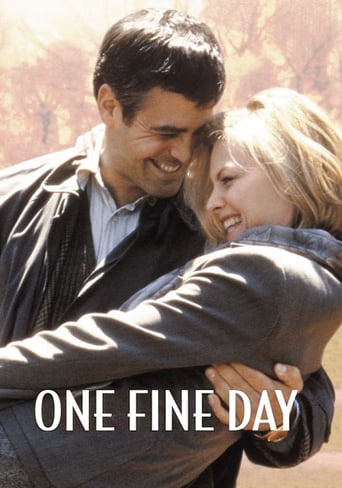
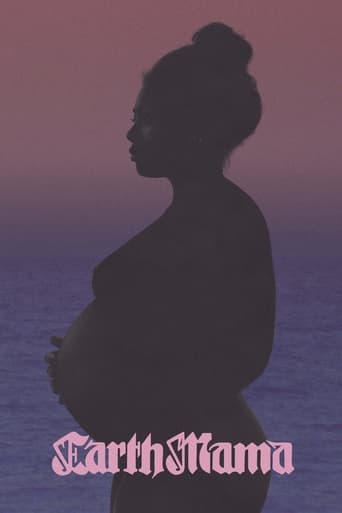

Reviews
Excellent adaptation.
A Masterpiece!
A clunky actioner with a handful of cool moments.
The movie really just wants to entertain people.
While watching this movie I was trying to determine when it was made. From the appearance of it (and props like the phones) I guessed maybe in the early 1990's. - but if I was going by the blatant anti-lesbian, anti- abortion propaganda of the movie I would guess that it was from the 1970's or older. Imagine my surprise when I found out from IMDb that this offensive piece of crap (which really doesn't even qualify as a horror film) was actually made in 2006. I can't remember the last time I saw something so disturbing (in an incredibly offensive sort of way) that was made within the past 10 years. There were numerous moments while watching the movie that I wanted to shut it off, but I kept hoping for the payoff, some kind of legitimate scare, but it never came.
The body underneath a sheet, blood seeping through, as it is being pulled away by some mysterious woman with a little girl looking on from her window--quite an indelible image to open this particular episode of the 6 films to keep you awake. Gloria goes to live in the home of Dr. Ana Torres, a daughter along with her, and she appears weary, baggage of the past visible on the face and in demeanor. A nurse Gloria will also assist Torres who keeps a lab in her home to perform abortions.A funny knock on the door to a room which Dr. Torres doesn't acknowledge yet Gloria hears. A phone call Dr. Torres strangely evades much to Gloria's dismay. It's very clear early on that Torres is interested sexually in Gloria, the way she caresses her hand or clutches the arm lovingly(it's insinuated and subtle, but obvious; Gloria seems puzzled and unsure how to respond to Torres' advances). Torres even mentions that she would like to help Gloria "pretty herself up", to bring out her beauty which seems to hide underneath a drab exterior.That phone call I mentioned--Christina, a woman sought after on the phone; her name appears on a necklace along with Ana's for which Gloria's daughter finds. Ana is a liberal, free-thinker who sees(perhaps blindly)Gloria as someone who has moved away from the old-fashioned principles of past society and asks her to help give abortions in the clinic. There's kind of an indication that Ana performs a steady influx of abortions regularly..Dr. Torres even seems to talk one young woman(who doesn't know which the father is between two men)into getting an abortion. Dr. Torres, though, informs her clients that she will perform these abortions when they are the most safe, before three months pregnant due to the danger.Ana represents change in mores, a lesbian who performs abortions without guilt, as if any other procedure and attempts to kiss Gloria. Gloria, on the other hand, is a bit put off by assisting in the aborting of a small fetus and resists an attempt by Ana to kiss her. Torres keeps trying, and Gloria keeps turning away. It's clear that Torres longs for companionship and love.Gloria learns from a busybody religious wallflower who lives next door that three women(obviously lovers)have came and went, Ana having coddled them until they no longer needed her. Then comes Javier which further complicates things. Then pregnancy. Torres is dejected in that her love is constantly spurned and instead Gloria is impregnated by a man who could never give that same kind of affection. But with an economy uncertain and possible lay offs looming at the hospital Gloria often works, the idea of having a second child absent a father seems too risky and troublesome a task to endure. Repercussions of an abortion become the turning point in the friendship of Gloria and Ana which results in tragedy. BLAME delves primarily into the topic of abortion and how it concerns the mental breakdown of one fragile woman who decides to have it done despite truly wanting to keep it. Gloria's daughter contributes to the breakdown by mentioning in various ways how she was disappointed in not getting a new brother. We see how other women make the choice and Dr. Torres gladly performs them without fail while Gloria reluctantly assists, later herself in the same position. This felt curiously anti-abortion, the way the procedure and those who have it(and the doctor performing them)is portrayed as almost a crime. Ana's little room in her home, the way women secretly enter therein wanting to be rid of what would be a burden on their lives, the hideous means with how the murdered fetuses are discarded through being flushed down a toilet like excrement. And the final frame of guilt-stricken Gloria balled into the fetal position speaking in the personality of her unborn, discarded child, before the director overlays the image of the fetus over her. BLAME never quite launches into a horror film as you would be led to believe, despite signs of an eerie presence as the principles hear noises, walk into ominous rooms, and through the strange behavior of Gloria's daughter who always seems to be hiding something. Nieve de Medina is Ana, Montse Mostaza is Gloria, and Alejandra Lorenzo is Gloria's daughter, Vicky. Well acted, competently directed, but for some reason this mini-movie never quite took off and the horror elements are lacking. Quite simply, this is more of a drama and I was expecting a horror film..I imagine this will elicit the same reaction from others.
Here's another entry into the 'Films to Keep you Awake' series but while its production values and its outgoing approach to one or two themes is very much present, La Culpa is nothing more than a short, sharp way to spend 70 minutes watching a horror film that although is foreboding at times, is nothing particularly special. La Culpa, I find, was written and directed by a Uruguayan man named Narciso Ibáñez Serrador; a man who has been writing and directing for decades so perhaps my reaction to the film being a little 'iffy' is down to a mere off day on the directors behalf.La Culpa translates into the English for 'Blame' but from memory, I cannot recall any reason for anyone to be 'blamed' for anything and nor can I really recall an underlying theme based on the title to tie in with the film's story and developments. For the record, Blame sees a struggling female nurse named Gloria (Mostaza) and her young daughter Vicky (Lorenzo) move in with a fellow nurse called Ana (de Medina). But there is supposedly more than meets the eye to this person. She has an abortion clinic set up within the walls of the house, the house itself shares a through-door with the next door neighbours and Ana's sexual preferences seem a little ambiguous at best. The trouble is, I think the film liked to think that it had all these ingredients and ideas going for it when really they were merely a series of set ups and let downs to fill up time. In fact, I do not think La Culpa can even be classed as a horror film but a mere urban drama revolving around a financially struggling single mother and her hardships.Take the abortion clinic for instance as an idea. Yes, abortions are always going to make for uneasy viewing when placed within the boundaries of a film but what do we actually get? Nothing of the frightening quantity. Then there is the door that leads into the adjoining house which for a horror film, is, I suppose a pretty good idea: 'where does this door lead? Why should the character's not go in? What's the knocking from the other side? But the set up and anxiety exists for only a mere scene or two it turns out there is a logical explanation for the door, where it leads and what's the other side of it. Yes, a creepy looking old woman lying in a bed in the room through the door can be perceived as creepy but when the owner of the house shows up and sates that it is someone's bedroom in next doors house, are we really going to be so full of anxiety come the next uncanny set up? I for one was not and this is where La Culpa lost me as a horror film.This idea continues on into one of the film's later scenes when Gloria approaches a 'creepy' rocking cradle. But by this point we are sort of confused; there is nothing uncanny in this film, right? This is taking place in the real world the house is not haunted and there are no such things as monsters. What is actually in the cradle sums up not only the film's approach but how we react to the foreboding set ups in the sense it's an anticlimax. If anything, Blame borrows from To Let in the same way the film involves a seemingly psychotic landlady, they both centre around a young adult who is either in a crisis due to impending birth or already owns a young child and they both seem to want the ambiguity of their respective locations to generate half the scares for the film. But while To Let's location was actually quite eerie because we had reason to fear what was going on, Blame extinguishes fear and anxiety early on resulting in the later exchanges to become anti-climatic.But La Culpa deserves credit for its general approach to its subject matter. I think the word 'blame' from the title has something to do with casual sex and unwanted pregnancy. I think the film is some sort of covert morality tale to do with sex before marriage the young girls come into the abortion clinic and we generally get all the nasty, hair tingling build up you'd expect when the abortion is prepared and then followed through and the flushed away. We get the anaesthetic, we get the blood and the talk during the operation with the only thing that is missing being the 'nod' to the females amongst the audience: "You don't want this to be you, do you?" So Blame demonises casual sex which is fair enough if the director is going to make that statement but it does so with a supernatural approach which is something I cannot reckon the thinking behind. Blame is willing to be slower and more sedate in its setting up of the situation. Scenes involving little Vicky and her mother exchanging, being picked up from school, etc. are sweet and everything but then the film is supposed to be scary, isn't it? La Culpa misses the mark as a horror film but as a vague statement on why kids should wait for marriage before sex I suppose it succeeds; but it does so through telling us how nasty abortions are and the how nasty the procedure is rather than giving us evil looking zombie babies and haunted houses come to think of it, maybe that's a good thing. But if elderly women asleep in beds in rooms you should not enter and characters finding odd looking goo on the floor and leading upstairs sounds scary to you then by all means give La Culpa a go. Since there are explanations for these events, the film fails for me.
When the single mother nurse Gloria (Montse Mostaza) has financial difficulties, her colleague and friend Dr. Ana Torres (Nieve de Medina) invites her to move with her six year-old daughter Vicky (Alejandra Lorenzo) to her old big house where she runs a gynecologic clinic. In return, Gloria would assist Ana in her clinic in the afternoons. Sooner Gloria finds that Ana dedicates to abortion in her clinic, and also that she is lesbian and has a crush on her. When Ana gets pregnant of her lover Javier, Ana proposes an abortion, and after more than three months, the reluctant Gloria accepts her offer with tragic consequences.The underrated "Películas Para No Dormir: La Culpa" is a macabre and very well constructed tale of guilty and madness with an intriguing screenplay with an unpleasant but realistic theme and a surprising plot point. The director Chicho explores the great cast (unknown in Brazil) and the characters are perfectly developed, with magnificent performances of Montse Mostaza, Nieve de Medina and the promising Alejandra Lorenzo. My vote is seven.Title (Brazil): "O Quarto da Culpa" ("The Room of the Guilty")

